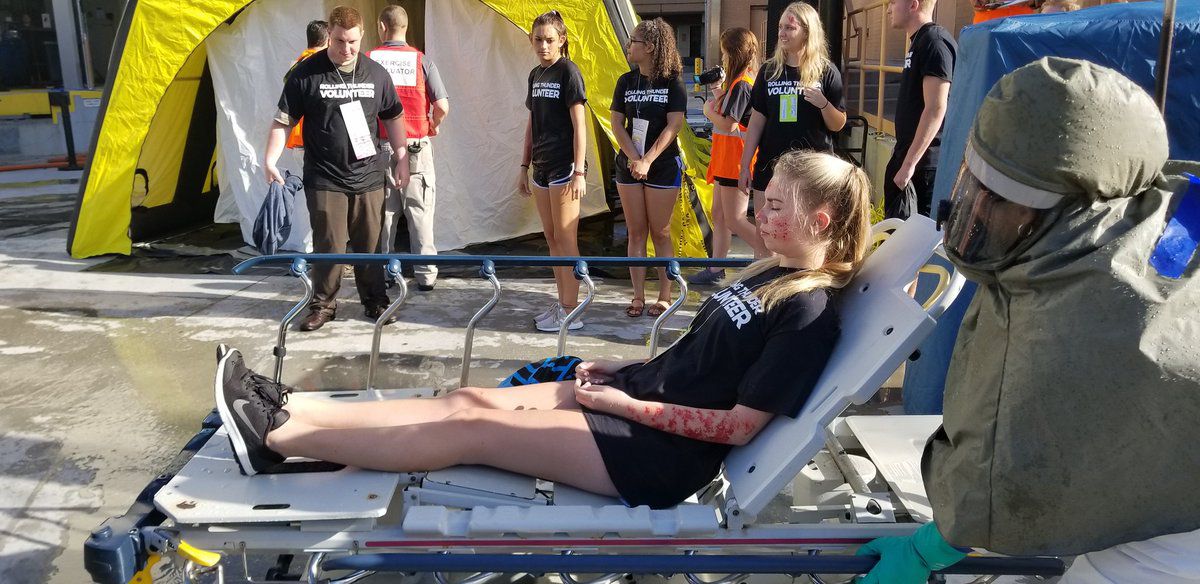ORLANDO, Fla. — Nearly two years later, Central Florida hospitals are still finding lessons in their response to the June 2016 attack at Pulse nightclub.
- Disaster drill employed Pulse lessons
- Better communication systems
- Involve the State Dept., consulates
- PREVIOUS STORY: Drill tests Central Florida's emergency services' readiness
More than 40 organizations, including Orlando Health, Federal Bureau of Investigations and the United States State Department were involved in a mass casualty drill Thursday. More than 500 volunteers played mock victims to test doctors, nurses and staff at hospitals throughout Orange, Seminole and Lake Counties.
“Trying to show the urgency and the importance of preparedness, and this is another building block,” said Eric Alberts, Corporate Manager of Emergency Preparedness at Orlando Health, and one of the architects of Thursday’s mass disaster drill.
The controlled chaos shows why communications is crucial in a crisis.
Alberts said one challenge they faced during Pulse was identifying patients and their relatives. In response, Alberts said they’ve since developed a web-based program that helps staff catalogue incoming patients during a mass casualty situation.
It’s a process that was put to the test during Thursday’s drill.
“We looked at the response at Pulse and we knew it was a big issue for us,” Alberts said. “It took all the way through until about 10 a.m. after Pulse for us to identify the last patient, reason being because of all of the medical conditions of that patient, not being able to speak, no birth marks, no tattoos. So that really highlighted the need for us to have a better, solidified process moving forward.”
Thursday’s drill also tested a second process, developed in response to Pulse, one aimed at helping to distribute information regarding foreign patients.
During Pulse, calls poured in from nearly 86 foreign consulates located in Florida, each wanting to know whether their citizens were involved in the attack.
“You can just feel the seconds ticking when you’re waiting to know, and you’re thinking of family members in Germany, or whatever country, and they’re waiting to know,” said Brock McClane.
McClane, an Orlando attorney, is an Honorary Consul of Germany.
During Pulse, his job was to identify and assist any potential German citizens who may have been a victim.
“Everyone was so shocked, and there was so much law enforcement on the job that it was hard to get the information right away, even though there was acknowledgement that we need to have information at some point,” McClane said.
While McClane worked to get information to send back to Berlin, so did John Corfield, who worked at the time as a Pro-Consul for the British Consulate in Florida.
“Consulates can help with patient identification, they can coordinate death notifications, getting messages back to family and friends. There’s an awful lot they can help with the response,” Corfield said.
Corfield now works as an Emergency Preparedness Specialist for Orlando Health, where he helped develop a new process to identify foreign patients, and relay crucial information to officials in their home country.
VISIT FLORIDA says 8.8 million foreign tourists visited the sunshine state in 2017.
“Communication is key, it really is a vital part of everything,” Corfield said.
At intake during a crisis, staff at Orlando Health hospitals will try to obtain details about a patient’s nationality. The process and survey also requests information from patients using terms and language that should be easily understood by the foreign patient.
Corfield says certain American terms can mean something else in another language, so there are multiple layers of challenges in developing a process.
Information about nationality and patient information is then relayed to the U.S. State Department, who in turn helps feed information to respective consulates and foreign government bureaus.



